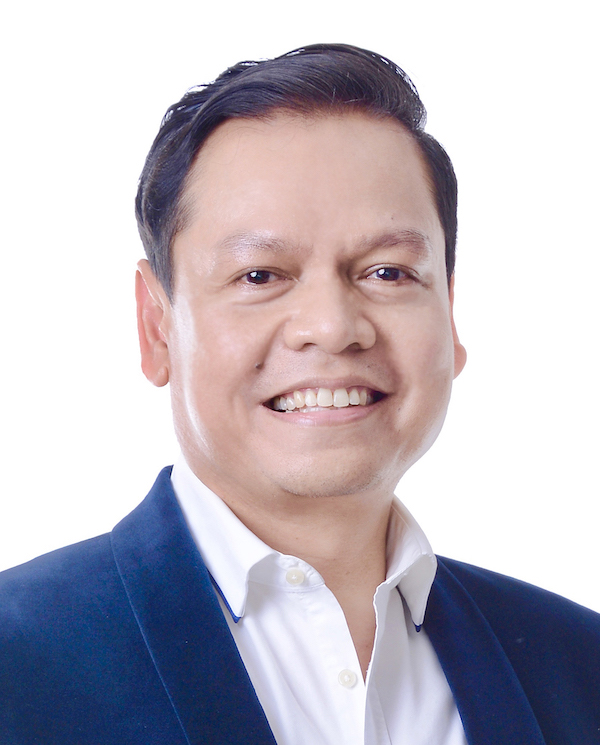 Muhammad Arif Hidayat
Muhammad Arif Hidayat
Head of the Cooperation Bureau
Ministry of Manpower, Indonesia
Young Leaders Program (’05)
Please tell us about your career path so far. What is your area of specialization and how did you come to work in this area?
I started my career by taking the CPNS (candidates for civil servants) test at the Ministry of Home Affairs. Starting as an ordinary staff, I then held several positions before I got promoted to serve in my last position in the Ministry of Home Affairs, as Head of the Inter-Country Cooperation
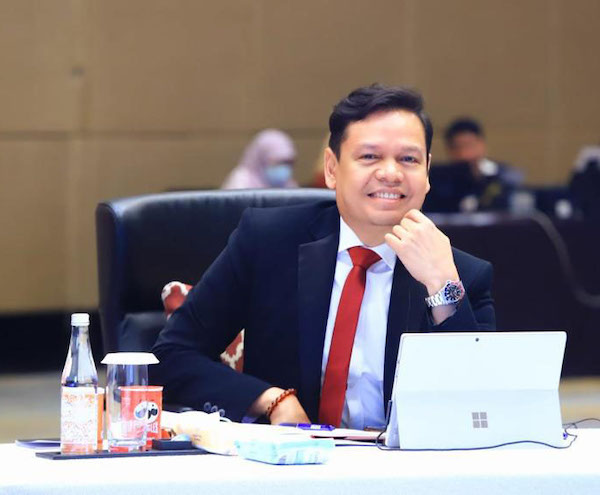
Arif in his role as Alternate Chair of the G20 Employment Working Group during one of the meetings held under Indonesia’s G20 Presidency this year
Division. While serving as Head of the Inter-Country Cooperation Division for almost five years, I facilitated the formation of sister city/sister province cooperation between local governments in Indonesia and local governments abroad, and the formation of thirty-seven Memorandums of Understanding. I also facilitated the support of thirty-six foreign experts who assisted several local governments in various fields, including public health, community development, sports, agriculture, spatial planning, and urban planning.
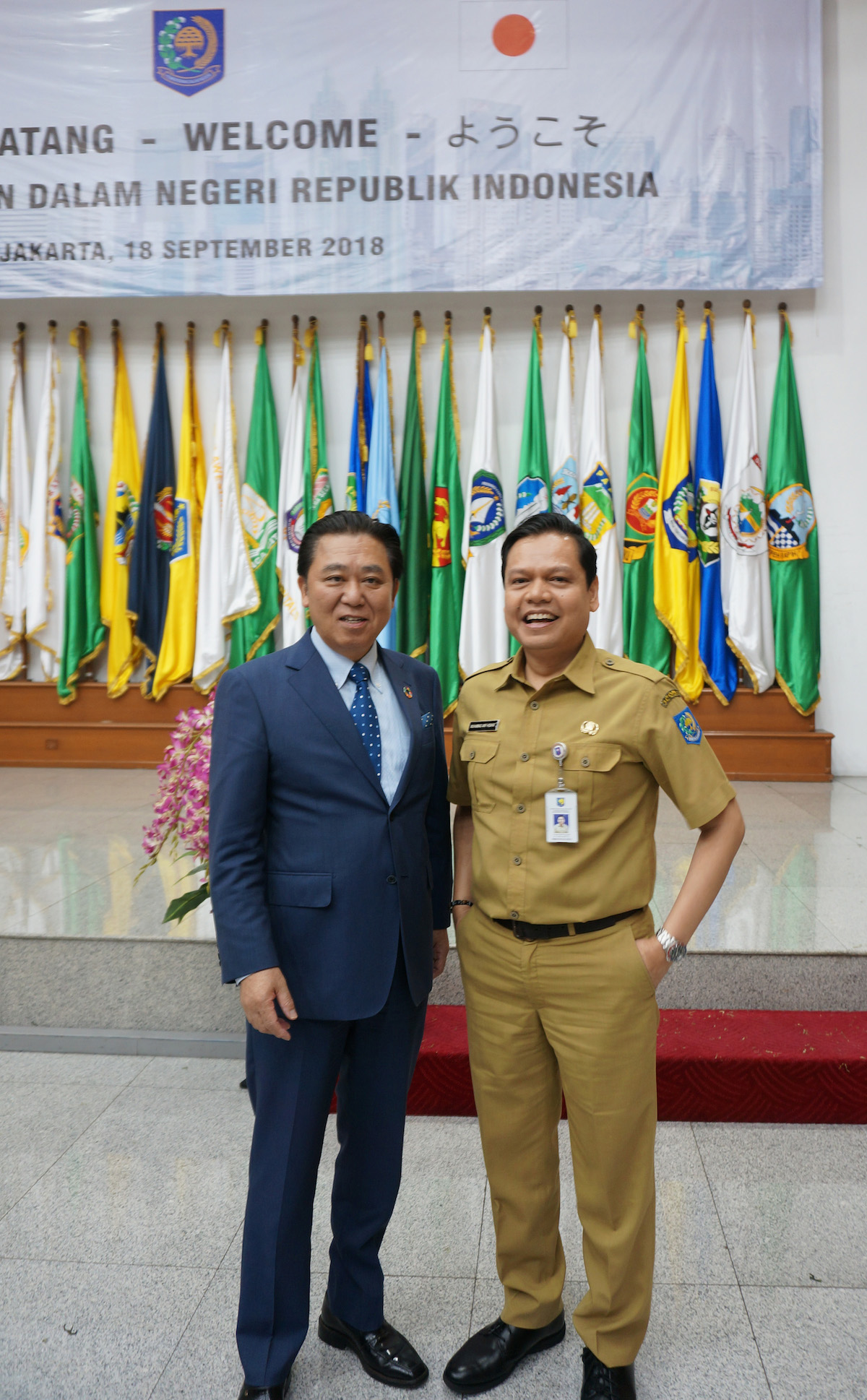
With the Mayor of Toyama, Japan, when he visited the Indonesian Ministry of Home Affairs in 2018
Seeing my experience in the area of cooperation that started on October 1, 2002, in the Ministry of Home Affairs, since the establishment of the Center for Management of Foreign Cooperation, I have remained consistent on this path. That consistency was even reinforced since I moved to the Ministry of Manpower through an open selection process, which was attended by participants from national and regional governments. And finally, in July 2021, I got a promotion and was selected to take office in my current position as Head of the Cooperation Bureau, Ministry of Manpower. Judging from the experience I conveyed above, I guess you can call my area of specialization “cooperation”. The various educational experiences I had in Europe and Japan have broadened my knowledge and experience, including how to strengthen communication and networking, as well as sharpening my interpersonal skills, which ultimately brought blessings in my daily work
You are currently serving as Head of the Cooperation Bureau at the Ministry of Manpower. What are your main roles and responsibilities?
As the Head of the Cooperation Bureau, I am dealing with both international and domestic cooperation. Among others, I am responsible for the coordination, coaching, the formulation of policy, guidance, instructions, as well as implementing cooperation for international and domestic cooperation in the Ministry of Manpower. For international cooperation, we, in the Cooperation Bureau, handle bilateral cooperation, regional cooperation, such as cooperation with the Association of Southeast Asian Nations (ASEAN) and the Indonesia-Malaysia-Thailand Growth Triangle (IMT-GT). We are also responsible for multilateral cooperation, such as cooperation with the International Labour Organization (ILO), Organization of Economic Co-operation and Development (OECD) and the Group of Twenty (G20).
As for domestic cooperation, we handle cooperation with local governments, development partners, and between ministries and institutions, including with universities, by establishing communication forums among universities in the sphere of employment.
In your current capacity, what do you see as the main opportunities and challenges for Indonesia over the course of the next five to ten years?
Indonesia will enter the peak of the demographic bonus in 2030. By then, the size of the productive age population will exceed that of the non-productive population. This is an opportunity as well as a challenge for Indonesia. For myself, in this case, since I work at the Ministry of Manpower, we have a role to ensure that the productive age population can be truly productive and well-prepared for the changing world of work. We will not let these productive human resources not be utilized properly because they do not have the required skills or because there are no available jobs. For this reason, we need a strategy for strengthening the competencies of young talent, such as improving their skills and capacity, expanding job opportunities, providing employment links and matches, and providing inclusive labor market information.
What are some of the biggest challenges you face in your work? And what have been the most interesting or rewarding aspects of your career thus far?
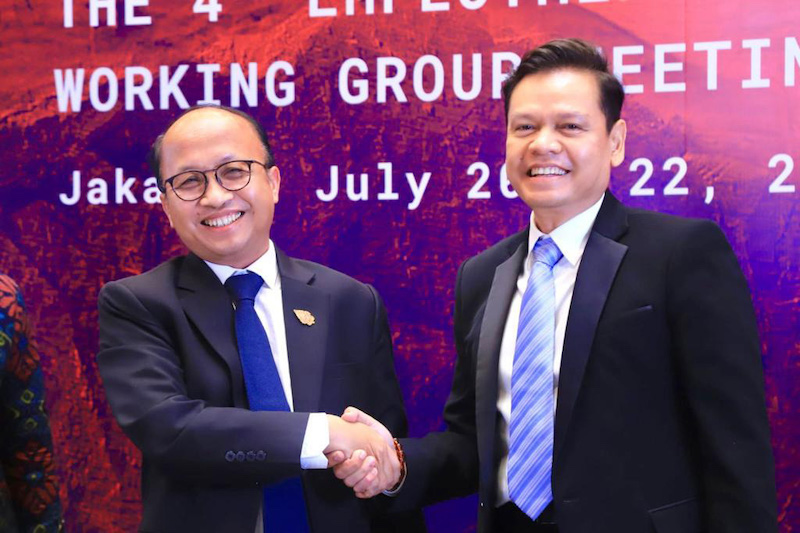
With GRIPS alumnus Prof. Anwar Sanusi, Ph.D., the Chair of G20 Employment Working Group (EWG), Secretary General of the Ministry of Manpower of the Republic of Indonesia
Indonesia holds the G20 Presidency in 2022. The G20 is an international forum focusing on policy coordination in economics and development. It represents the world’s economic and political power, with its members representing 80% of the world’s GDP, 75% of global exports, and 60% of the global population. The G20 consists of 19 countries and 1 region, namely: Argentina, Australia, Brazil, Canada, People’s Republic of China (PRC), France, Germany, India, Indonesia, Italy, Japan, Republic of Korea, Mexico, Russia, Saudi Arabia, South Africa, Turkey, United Kingdom, United States, and the European Union. With adopting the theme “Recover Together, Recover Stronger”, the Indonesian G20 Presidency carries the spirit of recovery together. Indonesia has chosen this theme since the world is currently under pressure due to the COVID-19 pandemic, requiring joint and inclusive efforts to find a way out or solutions for recovery.
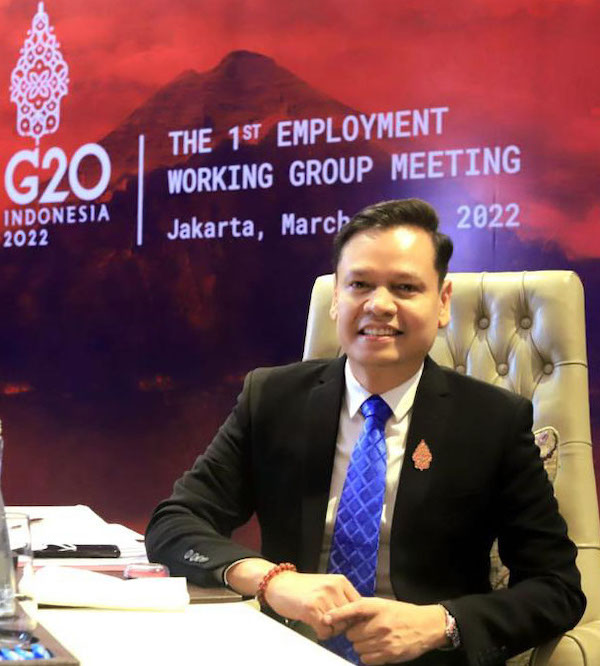
Arif acting as Alternate Chair of the G20 Employment Working Group (EWG) throughout Indonesia’s G20 Presidency in 2022.
This year, I am entrusted with being an Alternate Chair for the G20 Employment Working Group (EWG) of the Indonesian Presidency in 2022 and I have been appointed as the main general coordinator for organizing and orchestrating the entire series of the G20 Employment Working Group meetings, events, and activities. This year, EWG is one of the longest in holding a series of meetings in the G20 Working Group, the EWG held six meetings, of which three were virtual in Jakarta Indonesia, and the remaining three meetings were held in-person/hybrid in Geneva Switzerland, Yogyakarta Indonesia, and Bali Indonesia. We also organized the Labour and Employment Ministers’ Meeting (LEMM), held in Bali Indonesia. So far, this has been the biggest challenge as well as the most interesting or beneficial aspect of my career, where I have to accompany the Chair or replace the Chair temporarily in leading the meetings with nineteen G20 member countries, four permanent invited countries, and several international organizations, as well as engagement groups to discuss employment-policies based on the priority issues of the G20 that Indonesia is promoting. With all the dynamics that happen in the meetings, in which there are pros and cons to the issues, we, as the Chairs, must be able to act as impartial facilitators, providing equal opportunities to all member countries to express their opinions, and ensure the discussion runs smoothly in order to reach an agreement and the expected outcomes. Indeed, this is an extraordinary experience during my career, which can contribute to Indonesia and the world with the aim of “Improving the Employment Conditions to Recover Together.
What led you to GRIPS? What is the most important thing you got out of your studies, and how has your experience at GRIPS prepared you for future endeavors?
GRIPS is an educational institution that has broad, strong, and close connections with important and influential people in various sectors, both government and industry/private sector. GRIPS can call upon important people to share experiences and knowledge with students and engage them in some programs. This was an opportunity for students, including myself at that time, to strengthen our knowledge and network. In addition, I could also build close relationships with professors and employees in GRIPS.
GRIPS helped me hone my communication skills with people from foreign countries, improve my diplomatic skills, deal with and approach other people so that I can make good relations with international partners here. In addition, the relationship between Indonesia and Japan is still well maintained. For me, the networking continues to grow and comes together in my current role, through which I hope to contribute to further strengthening the mutually beneficial connection between our two countries.
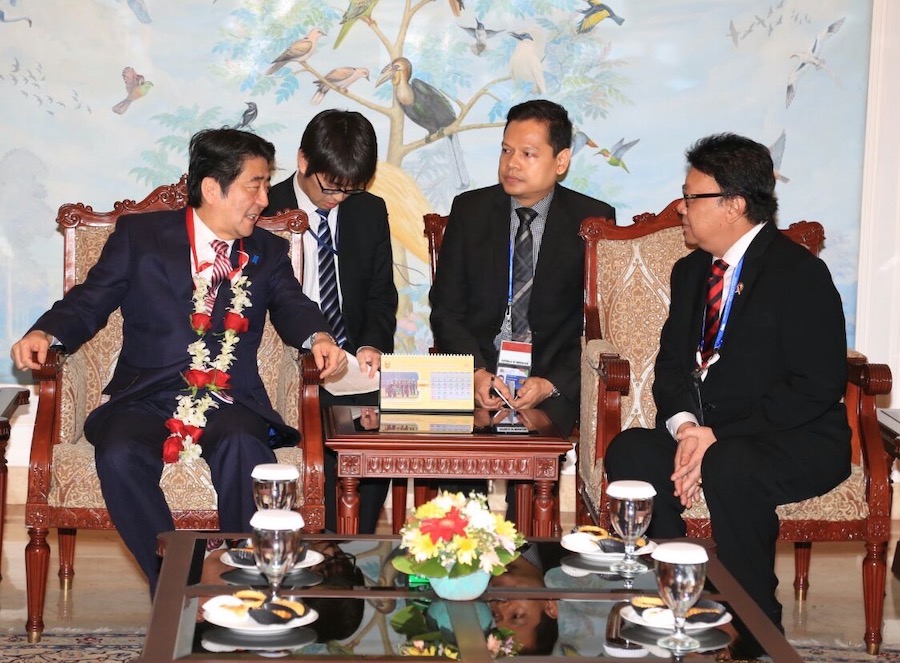
Arif accompanied the then Indonesian Minister of Home Affairs to welcome the late Japanese Prime Minister Shinzo Abe who was to attend the Asian African Conference Commemoration Indonesia 2015
Have you had any involvement, professional or otherwise, with Japan since your graduation?
Yes, I have supported and facilitated the formation of sister city/province cooperation with cities and prefectures in Japan. This includes the sister province cooperation between West Java Province and Shizuoka Prefecture, South Sulawesi Province and Ehime Prefecture, and sister city cooperation between Jakarta and Tokyo, between Bandung and Hamamatsu, and between Bandung and Toyota. Besides that, I have also facilitated the collaboration between the Tabanan Regency Government, Bali and the Toyama City Government in the renewable energy sector, the collaboration between the Surabaya City Government, East Java and the Kitakyushu City Government in the environmental sector. Also, I have provided facilitation and support for the Japan Overseas Cooperation Volunteers (JOCV) of the Japan International Cooperation Agency (JICA) program, which is a JICA volunteer assistance program placed in several regions or institutions in Indonesia. Other connections with Japan I have been involved in include facilitating the permit and placement of Labor Policy Advisors from JICA in Jakarta; facilitating coordination with related technical units regarding the implementation of the Sharoushi System training, and promoting the Specified Skill Worker program; promoting school opportunities at Japanese universities and encouraging the participation of young employees in Japanese scholarship programs, such as Young Leaders Program (School of Government, School of Local Governance) from GRIPS. My subordinate is currently studying at the International University of Japan sponsored by JICA.
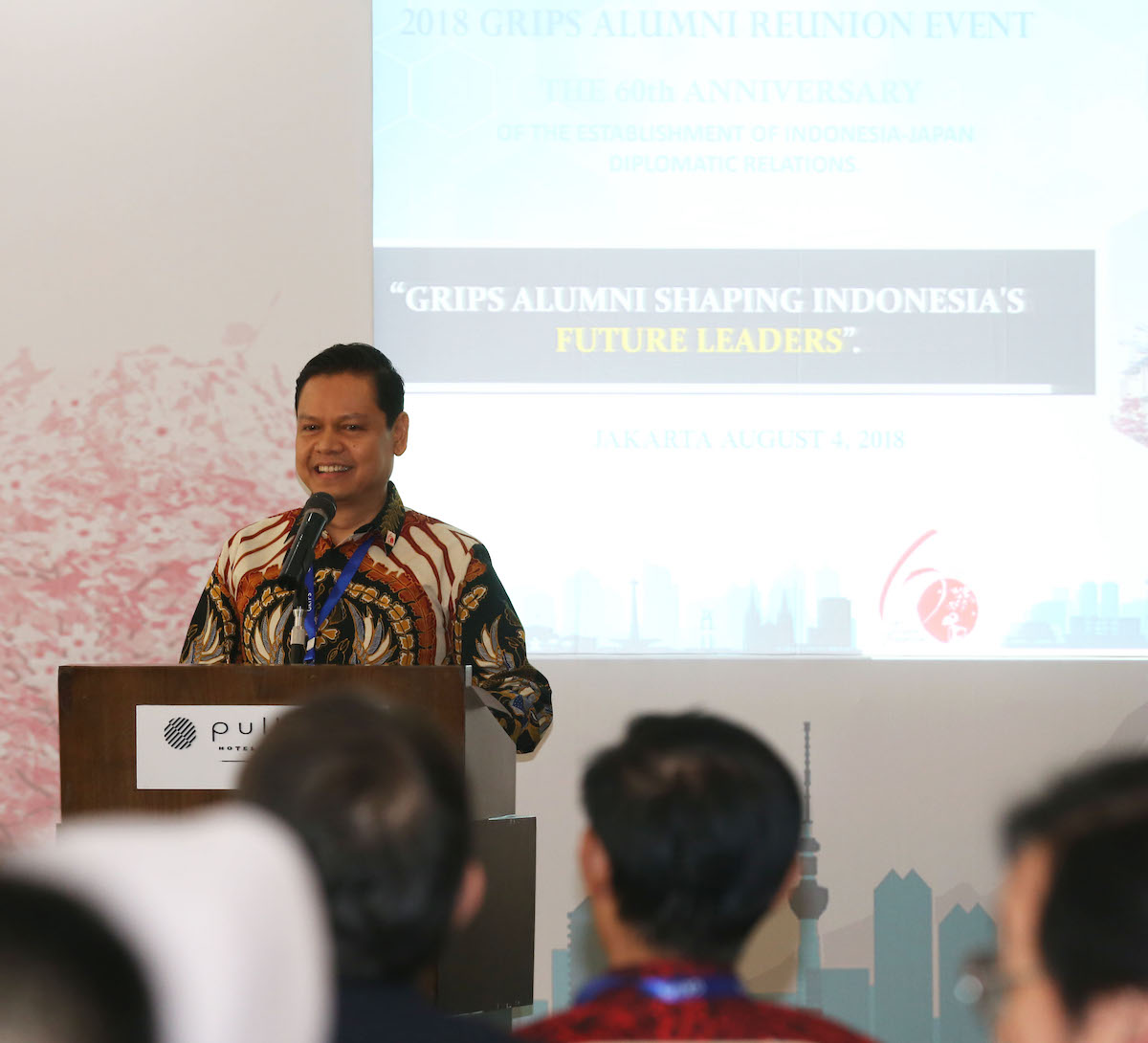
Arif as main coordinator in charge of organizing the GRIPS alumni reunion event in Jakarta, held on August 4, 2018
In addition, at the initiation of the professors who asked me to organize the GRIPS Alumni Reunion Event in Jakarta, Indonesia, which was held on August 4, 2018, I was asked to be the main coordinator of the event. We invited the speakers, namely Mrs. Sri Mulyani, Minister of Finance, Prof. Ginandjar Kartasasmita, Senior Fellow of GRIPS, Mr. Masafumi Ishii, Ambassador of Japan for the Republic of Indonesia, Prof. Akihiko Tanaka, the President of the National Graduate Institute for Policy Studies. The event was also attended by GRIPS professors, Indonesian high officials, and GRIPS alumni. At that time, we had 436 Indonesian Alumni from GSPS and GRIPS, and I was happy to receive attendance confirmation from 159 Alumni, even those who attended the event exceeded the confirmed number, which was estimated at over 200 people.
How do you maintain a balance between your work and the rest of your life? And what is your favorite thing to do when you are not working?
I like hanging out with friends and relatives and exercising in my spare time. Often after coming home from work, I stop by to look for foods and fruits that I like. This can lift my mood so that I am ready to work again afterward.
Certainly, my favorite thing to do when I am not working is doing my hobby, which is singing. However, singing is not just my hobby. I have maintained consistency in singing since childhood and keep trying to maintain as a professional singer. While studying at GRIPS, I performed on several stages in Tokyo. Also, I was the lead vocalist when working in the Ministry of Home Affairs and I am now the main vocalist in the Ministry of Manpower. I have also acted as the main coordinator in organizing choral competitions throughout the Ministry of Home Affairs and was the Main Judge for singing competitions at the Jakarta Private University. I also contributed my voice to the Social Foundation’s Theme Song, namely Blood for Life Foundation.
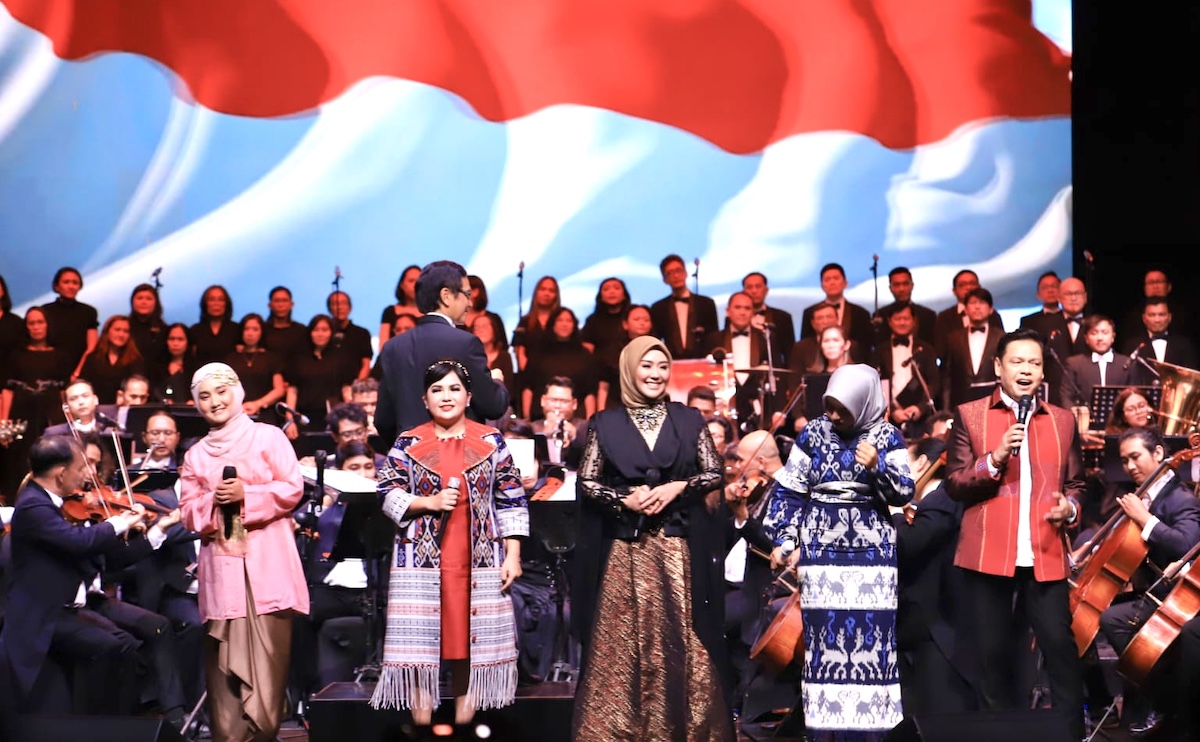
Arif singing in the National Concert commemorating the Republic of Indonesia Anniversary and the Anniversary of the Ministry of Manpower
Recently, at the Ministry of Manpower, I was one of the singers at the Great Nationality Concert with the Pride of the Homeland Orchestra, Twilite Orchestra led by Addie MS, and witnessed by over 1000 spectators. Here is the YouTube link of the event: https://youtu.be/a6PZEyyhGSI. If you’d like to know more, feel free to check my Instagram account @Arief MH. Lately, I also performed singing at the G20 Employment Working Group Gala Dinner and at the G20 Networking Dinner with Business 20 and Labor 20 which were attended by ministers, business and labour leaders from G20 member countries.
What are some of your fondest memories of your time spent at GRIPS? And what do you miss about Japan?
Some moments considered as my fondest memories during my study at GRIPS are participating in cultural events, studying with friends, going on field trips, and spending time
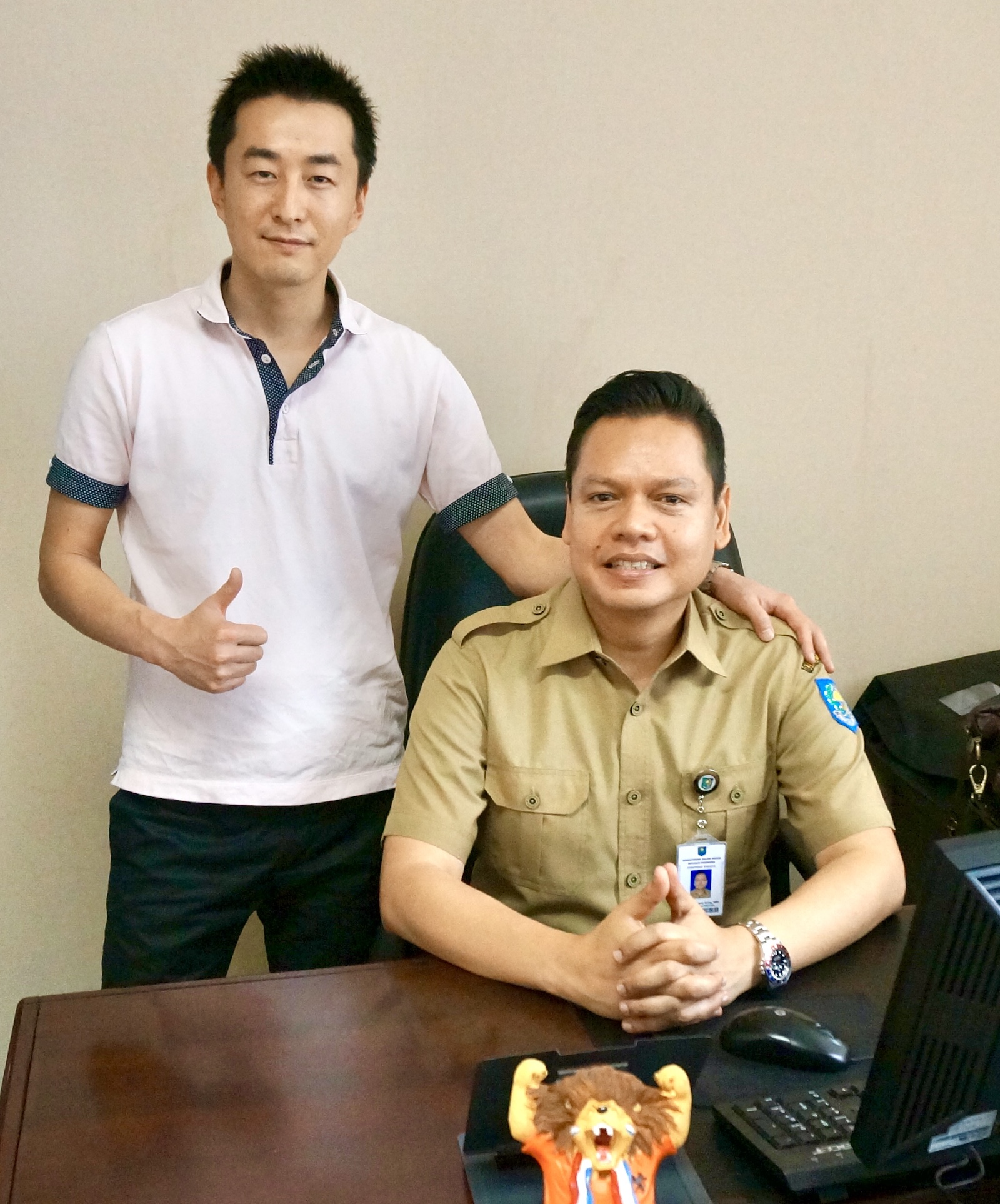
When his Japanese friend Masahiko Kobayashi, also an alumnus of GRIPS, visited Arif at his office in Jakarta
with supportive professors and faculty members there. I could build close connections with professors, lecturers, and faculty members, as well as classmates from various countries. I could also develop good relations with Japanese students, with whom I am still in touch and visit each other until now.
Another fond memory at GRIPS is when I could experience the transition from the old to the new campus. In the middle of my study, in April 2005, GRIPS moved from the old run-down building in Shinjuku to the brand-new state-of-the-art campus in Roppongi, one of Tokyo’s most cultural and affluent areas. There I could feel the atmosphere of the university with its new facilities, fresh air, and all-new ambiance.
I miss everything about Japan, its people, its weather, its environment, and much more. When spring arrived, when the cherry blossoms were blooming and the air temperature was no longer cold, my friends and I used to lay out mats in the park surrounded by cherry blossoms and ate together. Another experience that I miss from Japan is that during field trips, I could visit some areas that had very beautiful scenery and friendly people. After my graduation, I went back to Japan several times but the feeling, joy, and excitement were different from those during my study at GRIPS.
If you could give one piece of advice to anyone considering studying at GRIPS what would it be?
Studying at GRIPS was one of my best ever decisions. It was a once-in-a-lifetime experience. The programs offered by GRIPS are up-to-date and taught by excellent professors who have rich experience academically and practically.
Studying at GRIPS will enrich, not only our academic but also our social level. Their social activities will make us admire Japanese culture and philosophy.
The advice I can give to prospective students who are considering studying at GRIPS is that you can get to know more about Japan, its government, its culture, its traditions, and even its industry. Studying at GRIPS, in addition to the lessons you get, will provide you with access to government and industry and experience life in the local area in Japan through field trips or study visits.
How would you like to maintain involved with the School? What do you expect from GRIPS as an alumnus and do you have any suggestions on how to further utilize the GRIPS alumni network?
Even after more than 10 years, I still maintain active communication with my colleagues both from YLP and GRIPS, just to share experiences, and give insight and advice to new
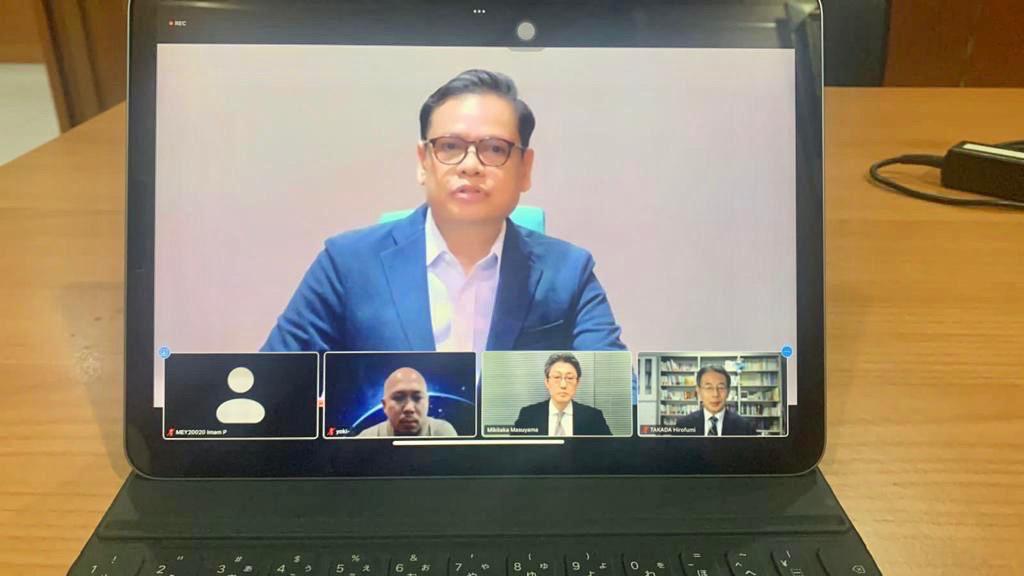
Arif participated as one of the speakers at the YLP-ASEAN Initiatives forum, in November last year
students either from Indonesia or from other countries.
Every time there is a program involving alumni at GRIPS, I am always active and included, especially for YLP alumni. Until now, I have also always maintained relationships with professors, lecturers, and faculty members.
Having friends and a network from several countries is one of the biggest benefits of studying at GRIPS. For example, in my work, I need to maintain communication with several countries, including Japan. Sometimes, I call my colleague in Japan when I have some business with Japan.
In Indonesia, the alumni association is well-maintained. GRIPS itself can help to maintain the alumni association. We together can create some programs that can accommodate the insight of alumni.
I hope GRIPS can have a continuous program that can unite alumni, whether it be in the form of seminars, workshops, forums, or homecoming programs that involve alumni, not only those that are established and successful but also potential and emerging alumni, even those who may be currently handling crucial and important issues in the global sphere to share views and insights for programs at GRIPS.





